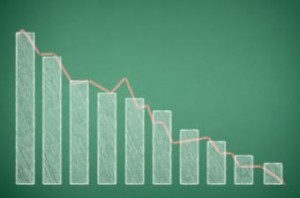 Consumer sentiment dropped substantially in the first May reading in the University of Michigan's Consumer Sentiment Index, from 95.9 in April down to 88.6, its lowest level since October of last year.
Consumer sentiment dropped substantially in the first May reading in the University of Michigan's Consumer Sentiment Index, from 95.9 in April down to 88.6, its lowest level since October of last year.
The decline of 7.3 percentage points was the largest month-over-month drop for the index since December 2012 and the 21st largest in the history of the survey, which began in 1978, according to Bloomberg.
Slow economic growth in the first quarter was the largest contributing factor in the large dropoff in consumer sentiment, according to analysts. The decline of more than 7 percentage points comes just one month after the Sentiment Index reported its highest five-month average in 11 years.
"Confidence fell in early May as consumers became increasingly convinced that there would be no quick and robust rebound following the dismal first quarter, even if the underperformance was exaggerated by inadequate seasonal adjustments," said Richard Curtin, Director of the Survey Research Center for the University of Michigan. "The decline was widespread among all age and income subgroups as well as across all regions of the country. In contrast to last year's rapid 2nd quarter revival, this year the economy faces reduced production and employment from lower oil prices, falling exports, and rising imports from a stronger dollar."
The silver lining for the preliminary May reading for the Sentiment Index is that it is up year-over-year from May 2014, when it was reported at 81.9 percent. Economist still believe the wage growth has not been sufficient enough to facilitate full economic recovery; in the last employment summary released by the Bureau of Labor Statistics earlier this month, hourly wage gains rose by 2.2 percent year-over-year up to $24.87. For non-supervisory employees, hourly wages increased by 2 cents year-over-year in April up to $20.90.
"The decline in confidence reflects a series of reports that highlight the fragility of the economic expansion. While the recent decline is disappointing, we're still up on a year-over-year basis," said Len Kiefer, deputy chief economist at Freddie Mac. "Insofar as we see an improvement in economic reports and a strengthening of the labor market confidence should rebound. But we're going to need to see actual real income gains on a sustained basis if we ever hope to see confidence recover and the expansion kick into a higher gear."
April's Sentiment Index reading of 95.9 was the second-highest since 2007, second only to January 2015. Curtin said despite the large decline in the index for May, consumers' attitudes toward personal finances and spending habits have stayed positive.
"Although this was not the first time in recent years consumers have abandoned expectations for a faster recovery, the data nonetheless suggest that consumers have remained optimistic about their future personal finances and have maintained their buying plans at reasonably high levels," Curtin said. "Overall, at this time the data are still consistent with a 3 percent growth rate in real personal consumption expenditures during 2015."
The next release for the University of Michigan Consumer Sentiment Index will be on Friday, May 29.

 theMReport.com Your trusted source for mortgage banking news
theMReport.com Your trusted source for mortgage banking news








